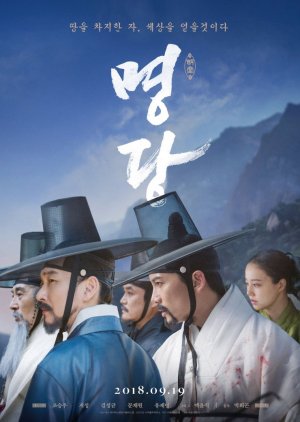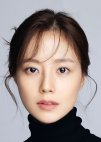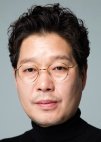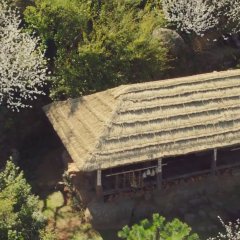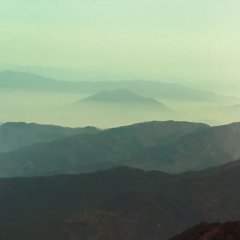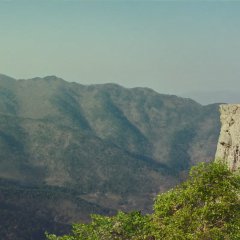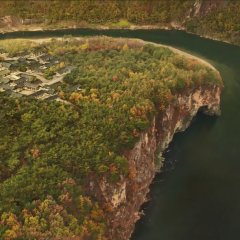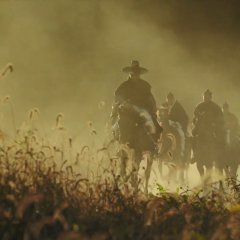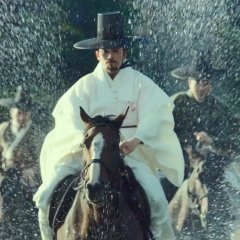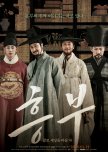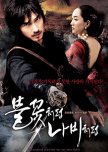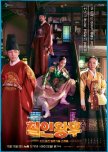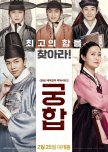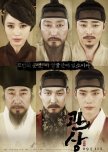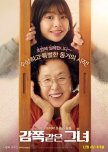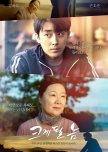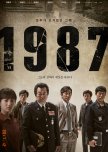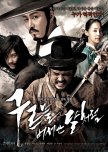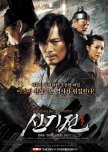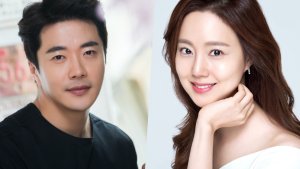 Kwon Sang Woo and Moon Chae Won to lead romantic comedy film "No Kids"
Kwon Sang Woo and Moon Chae Won to lead romantic comedy film "No Kids" - Português (Brasil)
- Español
- Українська
- English
- Título original: 명당
- Também conhecido como: Myungdang , Grave Site , Great Site , Fengshui , Auspicious Grave Site , Auspicious Grave , Propitious Site for Grave
- Diretor: Park Hee Gon
- Gêneros: Histórico, Drama
Onde assistir FengShui
Grátis (sub)
Elenco e Créditos
- Jo Seung Woo Papel Principal
- Ji Sung Papel Principal
- Kim Sung Kyun Papel Principal
- Moon Chae Won Papel Principal
- Yoo Jae Myung Papel Principal
- Park Choong Seon Papel Principal
Resenhas

Todo conceito de Dianastia Joseon é um pedacinho de quebra-cabeça
Eu esperei taaaaaaaaaaaaanto pra poder assistir esse filme. E, dessa vez, fui cativada simplesmente pelo plot apaixonante, ninguém no cast me chamou assim tanta atenção, como é de costume que aconteça. FengShui me fez relembrar a mesma emoção que senti quando dei play no meu primeiro drama histórico coreano, Hwarang, já que tudo que eu pude fazer enquanto os primeiros minutos do filme rolavam foi ficar admirada, apaixonada e extasiada. Mas esse filme é muito diferente de tudo que eu já vi, não tem romance, nem bishounen nem nada que normalmente me atrai em produções asiáticas. Mas a ideia de conhecer um pouco mais do universo clássico do fengshui me atraiu numa instância que eu não pude pensar em outra coisa durante todas as duas horas de filme.O plot de Fengshui é simples: Reis da dinastia Joseon consultam seus ditos "Mestres de Fengshui" para saber em qual terreno devem enterrar a família real, de acordo, é claro, com o fengshui que, na época, era visto como um tipo de arte "geográfico-intuitíva" que podia prever a energia das coisas do mundo e, consequentemente, a fertilidade do solo onde os reis seriam enterrados. Até aí tudo bem, eu me apaixonei justamente por essa ideia de mestres de fengshui existindo ativa e naturalmente durante a era Joseon, já que essa não é uma coisa comumente retratada nos dramas históricos coreanos que eu normalmente assisto. Agora, a problematização começa quando um dos aprendizes de mestre de fengshui tenta intervir na decisão dos seus superiores, alegando que o terreno que eles escolheram para enterrar o próximo rei estava amaldiçoado por N motivos. É a partir daí que tudo se desenrola, a partir dessa ideia de que os mestres de fengshui podiam estar mentindo para destronar o rei colocando uma maldição em seu sepulcro.
Tudo depois disso é quase pura política atrelada com a arte do fengshui. O filme tem massacres, traições dentro da corte, mestres de fengshui roubando mapas e fugindo da casa de seus superiores como adolescentes que fogem de porcos, além de várias cenas fascinantes do protagonista explicando às pessoas comuns como ter êxito na vida a partir da arte do fengshui.
Todo o cenário é lindo, das vestimentas às paisagens, mas eu sou suspeita para afirmar, já que sempre tive uma grande queda com esses conceitos medievais.
Com certeza é um filme super recomendável, todos que são apaixonados por cultura asiática deveriam assistir, a imersão é estonteante.
Esta resenha foi útil para você?

Esta resenha pode conter spoilers
Everything stands or falls with the choice of an auspicious place. Insights into Korean geomanticsm
"FengShui" is a historical KMovie that addresses the political takeover by Heungseon Daewongun and his son, King Gojong. Even more, it deals with the Korean version of geomancy - Pungsu-jiri-seol = theory about the relation between wind, water and earth - which has accompanied the country across all dynasties since at least the late 9th century. The traditional theoretical concepts, studies and observations are about which constellations in the landscape bring luck or misfortune to people. In South (and North) Korea there is hardly any building, tomb, temple, or city that was not built from the point of view of Pungsu. To this day, Pungsu is still quite popular.Against this background, one could understand the movie "FengShui" as a nice, sometimes exciting story that comes up with a pointedly, rather apolitical, and for some even esoteric explanation about the ending of the Joseon Dynasty: At last, it was the (wrongly?) chosen location of the tomb that decided the end of the empire...
In any case, the story dramatically illustrates the importance of Pungsu to the people of (Silla, Goryeo, and) Joseon. And by the way, it gives an insight into the political situation during the last decades of Joseon. Without reference to this, however, one may be a bit surprised about the scramble for graveyards and also the struggle for power at the palace would be an interchangeable one among the many stories available on screen... No matter which glasses you choose, the cast in any case guarantees top-class performance.
Eventually, if you are interested in Korean society and history, the KMovie "FengShui" opens up an understanding of the great importance regarding the harmony (or disharmony) of human life with natural events (such as weather and seasons) as well as in relation to geographic features of the landscape (such as mountains and lakes and landscape) - as they are having a direct impact on human health as well as the fortune or misfortune of personal, family or even national fate. Everything stands or falls with the choice of an auspicious place (Myeong-dang) for one's own house, grave, market square, administrative headquarter, temple, fortification, palace, etc.
The teaching goes back to the Buddhist monk Doseon (826-898). He was a Daoist master and Zen Buddhist student who adapted the Chinese principles of feng shui to the Korean landscape and cultural environment. What is special about it is the concept "grow with nature", which in this respect focuses on an analysis of the spiritual and matter-related energies of mountains and landscapes as well as their effects on human life. (Interior furniture etc. plays a minor role in Korean pungsu.)
The KMovie "FengShui" puts a Pungsu master at the center of the story. Due to the more or less favorable choice of location, he can predict and influence how the fortunes of the people affected will develop. In this case, by using this knowledge to choose the most favorable burial site, he becomes a veritable kingmaker.
By the way:
All 42 royal tombs of the Joseon Dynasty over a period of more than 500 years are largely undamaged to this day. This is worldwide unique. All are arranged in the landscape according to the teachings of Pungsu - at most close enough to the capital for the royal family to visit the tomb within one day. (The concrete design of the complex was based on Confucian specifications.)
By the way:
The historical starting point of the story is the fact that Heungseon Daewongun, a central political figure of the last Joseon decades, moved his father's tomb on the advice of a Pungsu master. The new setting somehow promised that 2 kings would come out of his family. That was actually the case. But after that, the Joseon Dynasty came to an end.
------------------------- SIDE NOTE: --- Myeong-dang and Korean Pungsu ---
Pungsu officially goes back to the monk Doseon. But there are also sources that indicate that there was already a spiritual tradition with human-nature harmony on the peninsula, the aim of which was to efficiently balance landscape and topography, natural forces and sanshin (mountain spirits) in order to determine the fate of the purposefully influencing people.
Doseon's works have not survived. But his yin-yang geomancy was handed down in the works of later Confucian scholars. In the 12th century book "Haedong-Pirok" about the secret history of the country Doseon's theories were mentioned and even expanded. 5 centuries later, Yi Jung-hwan (1690-1752) in "Tangni-chi" analyzed the topography and landscape of the entire peninsula according to these geomantic points of view.
Central to this is the concept of Gi (forces of matter) as opposed to Li (forces of Heaven and Spirit). Mountains, and in particular the central mountain range that stretches like a spine across the peninsula, are the source of Gi. The energy flows, so to speak, from the mountains into everything that the landscape produces, into the water and into the air - all that nourishes the humman being. Gi thus becomes concrete and figuratively the source for a strong, happy people.
Another central concept is "Hyeol": a place of perfectly balanced forces of heaven (cheon-gi) and earth (ji-gi) from which people benefit the most. Such Hyeol with high, positive energy potential include, for example, Jiri-san's Cheonghak-dong valley in the south of Samshin-bong peak or the location of Buseok-sa temple on Sobaek-san. "Hyeol" actually means an ´opening´. Like the 9 openings of the human body, there are also openings in the landscape through which energies can enter and escape. If you like, Hyeol could be considered acupuncture points in the mountain landscape. Knowledge and control of Hyeol thus is highly related to power. A more ancient term for Hyeol comes from the shamanistic tradition: 'Myeong-dang', the (spiritually) lightful or auspicious place. The idea behind it: Bedding the ancestors at the auspicious place can bring prosperity, power and good fortune to future generations. Bedding the kings at auspicious places accordingly brings prosperity, power and good fortune to the nation.
...The KMovie is originally named "Myeong-dang"...
---------------------------------------------------------------------
Esta resenha foi útil para você?

